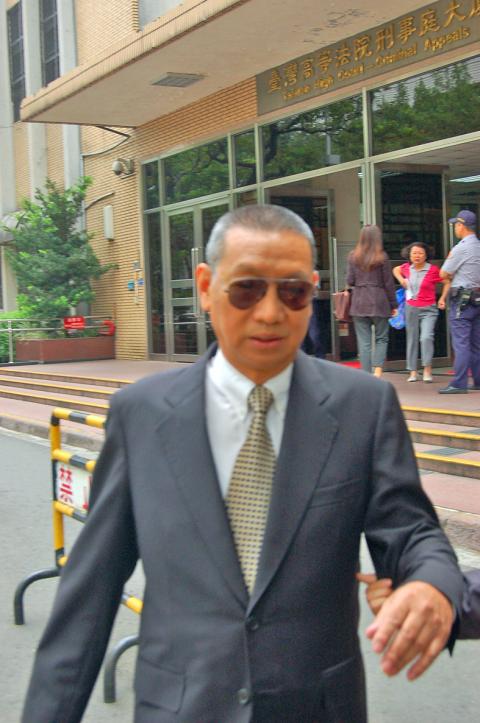The Taiwan High Court yesterday overturned the conviction of retired army lieutenant-general and deputy commander of the Military Police Command Chen Chu-fan (陳築藩) on charges of conducting espionage, leaking military secrets to China and recruiting subordinate military officers as spies, citing insufficient evidence.
Prosecutors are likely to appeal yesterday’s ruling.
In the first ruling on the case in 2013, Chen, then 67, was found guilty and given a 20-month prison term for contravention of the National Intelligence Services Act (國家情報工作法) and the National Security Act (國家安全法).

Photo: Yang Kuo-wen, Taipei Times
Chen, a high-ranking Chinese Nationalist Party (KMT) member with considerable influence and connections in military and political circles, was a former deputy director of the KMT’s Taipei City chapter and headed one chapter of the party’s Huang Fu-hsing (黃復興) military veterans’ organization, as well as directing the Ministry of National Defense’s liaison office for the legislature.
When the high court handed down the ruling yesterday morning, Chen rose from his seat to take a bow, and said “Thank you” to the presiding judge.
Chen was charged in 2013, along with retired army major Chen Shu-lung (陳蜀龍), who had long worked for the ministry’s Military Intelligence Bureau and had access to highly sensitive military documents, including the names of Taiwan’s secret service operatives working in foreign countries.
The Supreme Court in 2014 upheld the guilty verdict and five-year prison term for Chen Shu-lung, who was 74 at the time.
According to the 2014 court ruling, Chen Chu-fan began taking frequent trips to China upon his retirement in 2004, then went on to establish links with the Shanghai City State Security Bureau, its deputy director and other Chinese intelligence officials.
Prosecutors said surveillance and telephone wiretaps indicated Chen Chu-fan agreed to recruit Taiwanese military officers for a spy network and later introduced Chen Shu-lung to Chinese intelligence officials.
The two men were accused of selling documents pertaining to the defense ministry’s troop deployment and readjustment planning, the government’s election analysis reports, the KMT’s internal report on Taipei election campaigning by the Huang Fu-hsing branch, information on the ministry’s military exercise program and information on Falun Gong members and their activities in Taiwan.
Chen Shu-lung was suspected of leaking names of Taiwanese intelligence operatives working abroad, which led to one National Security Bureau officer serving as a diplomat in Japan having his cover blown and being interrogated by Chinese authorities for three days during a visit to Shanghai.

Taiwan is stepping up plans to create self-sufficient supply chains for combat drones and increase foreign orders from the US to counter China’s numerical superiority, a defense official said on Saturday. Commenting on condition of anonymity, the official said the nation’s armed forces are in agreement with US Admiral Samuel Paparo’s assessment that Taiwan’s military must be prepared to turn the nation’s waters into a “hellscape” for the Chinese People’s Liberation Army (PLA). Paparo, the commander of the US Indo-Pacific Command, reiterated the concept during a Congressional hearing in Washington on Wednesday. He first coined the term in a security conference last

Prosecutors today declined to say who was questioned regarding alleged forgery on petitions to recall Democratic Progressive Party (DPP) legislators, after Chinese-language media earlier reported that members of the Chinese Nationalist Party (KMT) Youth League were brought in for questioning. The Ministry of Justice Investigation Bureau confirmed that two people had been questioned, but did not disclose any further information about the ongoing investigation. KMT Youth League members Lee Hsiao-liang (李孝亮) and Liu Szu-yin (劉思吟) — who are leading the effort to recall DPP caucus chief executive Rosalia Wu (吳思瑤) and Legislator Wu Pei-yi (吳沛憶) — both posted on Facebook saying: “I

The Ministry of Economic Affairs has fined Taobao NT$1.2 million (US$36,912) for advertisements that exceed its approved business scope, requiring the Chinese e-commerce platform to make corrections in the first half of this year or its license may be revoked. Lawmakers have called for stricter enforcement of Chinese e-commerce platforms and measures to prevent China from laundering its goods through Taiwan in response to US President Donald Trump’s heavy tariffs on China. The Legislative Yuan’s Finance Committee met today to discuss policies to prevent China from dumping goods in Taiwan, inviting government agencies to report. Democratic Progressive Party Legislator Kuo Kuo-wen (郭國文) said

The Ministry of Economic Affairs has fined Taobao NT$1.2 million (US$36,900) for advertisements that exceeded its approved business scope and ordered the Chinese e-commerce platform to make corrections in the first half of this year or its license would be revoked. Lawmakers have called for stricter supervision of Chinese e-commerce platforms and more stringent measures to prevent China from laundering its goods through Taiwan as US President Donald Trump’s administration cracks down on origin laundering. The legislature’s Finance Committee yesterday met to discuss policies to prevent China from dumping goods in Taiwan, inviting government agencies to report on the matter. Democratic Progressive Party